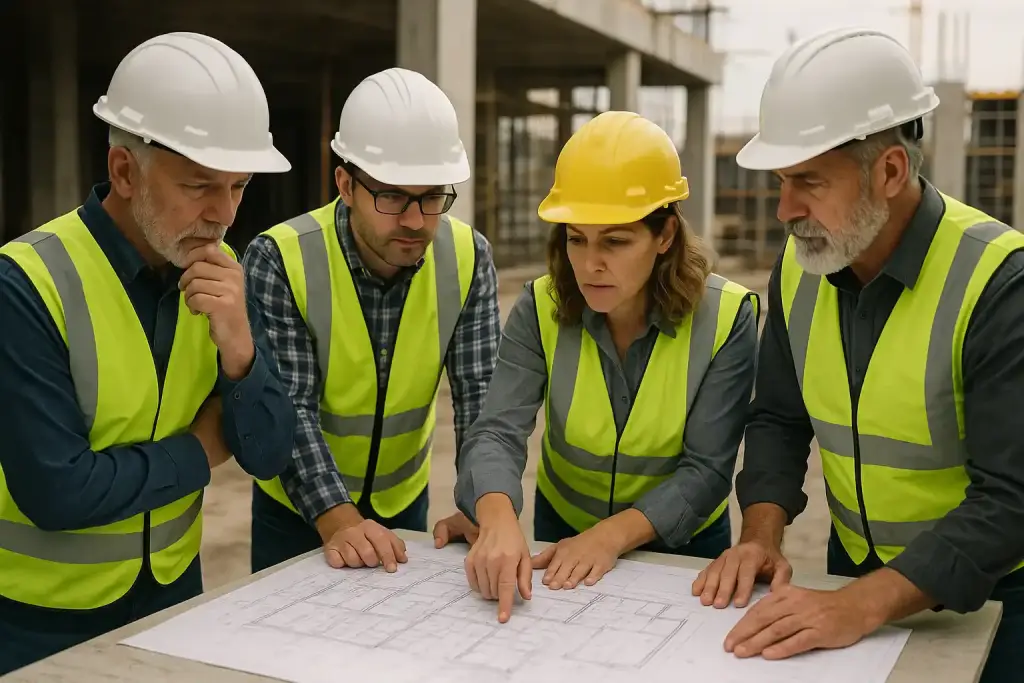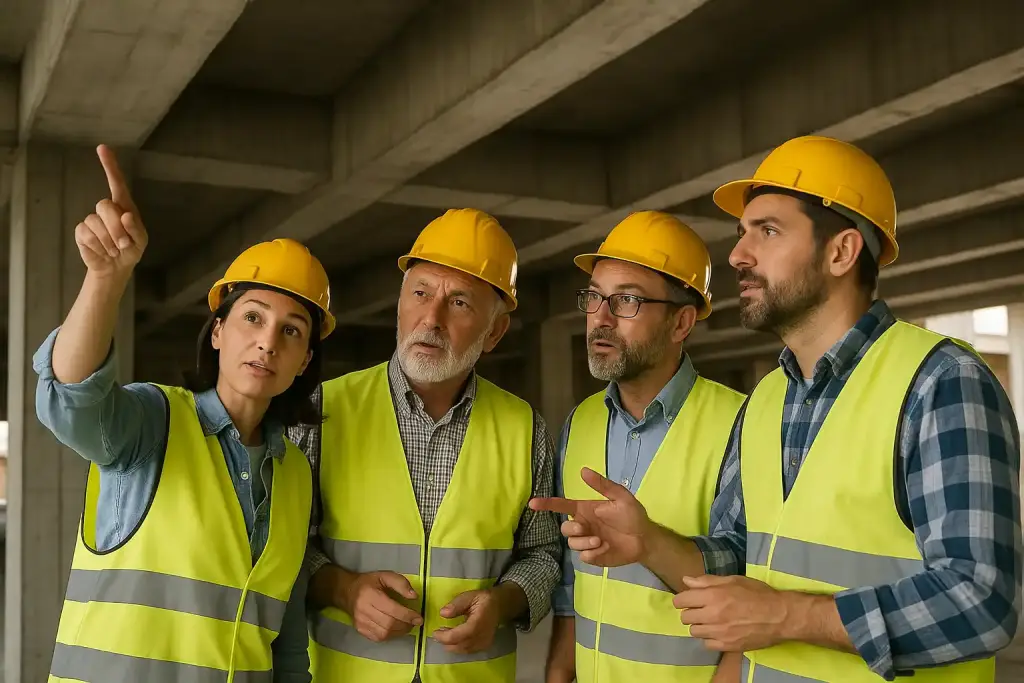- Introduction
- The Critical Roles: Who Makes the Difference
- The Cost of Inexperience: What Goes Wrong
- The Advantages of Experienced Teams
- Strategic Planning and Phase Management
- Economic Impact: The True Cost of Experience
- Building and Maintaining Professional Teams
- Technology and Experience: A Powerful Combination
- Conclusion: Investing in Excellence
Introduction
In the construction industry, where precision meets deadlines and safety standards intersect with budget constraints, there’s one factor that consistently determines project outcomes: the experience and professionalism of the on-site team. Whether it’s the project manager coordinating multiple trades, the foreman ensuring quality standards, or the skilled craftspeople executing the work, experienced personnel form the backbone of successful construction projects.
The construction site is a complex ecosystem where split-second decisions can have lasting consequences. A seasoned team doesn’t just complete tasks—they anticipate problems, implement solutions, and deliver results that stand the test of time. Understanding why experience matters can help property owners, developers, and even fellow contractors make informed decisions about their construction partners.
The Critical Roles: Who Makes the Difference
Project Managers and Site Supervisors
Experienced project managers serve as the orchestra conductors of construction sites. They possess the foresight to identify potential bottlenecks before they occur, maintain seamless communication between different trades, and ensure that projects stay on schedule and within budget. Their years of experience have taught them to read situations quickly and make decisions that prevent small issues from becoming major problems.
Foremen and Crew Leaders
The foreman acts as the crucial link between management and the workforce. Experienced foremen understand not just the technical aspects of construction but also how to motivate teams, maintain quality standards, and ensure safety protocols are followed. They can spot potential issues in real-time and adjust workflows accordingly.
Skilled Tradespeople
From electricians to carpenters, plumbers to roofers, experienced tradespeople bring irreplaceable knowledge to every project. They understand not just how to perform their tasks but why certain methods work better in specific situations. This deep understanding comes only from years of hands-on experience across various project types and conditions.
The Cost of Inexperience: What Goes Wrong
Quality Compromises and Rework
Inexperienced crews often focus solely on completing tasks without understanding the broader implications of their work. This tunnel vision leads to quality issues that may not become apparent until later stages of construction—or worse, after project completion. Common problems include:
- Improper installation techniques that fail to meet building codes
- Poor attention to detail resulting in aesthetic issues
- Inadequate understanding of how different building systems interact
- Failure to follow manufacturer specifications, voiding warranties
Safety Incidents and Liability
Construction sites are inherently dangerous environments where experience literally saves lives. Inexperienced workers are statistically more likely to be involved in accidents due to:
- Insufficient understanding of safety protocols
- Lack of hazard recognition skills
- Improper use of tools and equipment
- Poor communication about safety concerns
These incidents not only endanger lives but also result in project delays, increased insurance costs, and potential legal liabilities.
Schedule Delays and Budget Overruns
Inexperienced teams often underestimate task complexity and duration, leading to:
- Unrealistic scheduling that cascades into delays
- Inefficient work methods that waste time and materials
- Frequent mistakes requiring rework and additional materials
- Poor coordination between trades causing bottlenecks





“In construction, experience isn’t just an advantage—it’s the difference between building something that lasts and building something that looks good until the first storm. Every mistake teaches you ten things, but it’s better to learn from someone else’s ten thousand mistakes than to make your own.”
— Marcus Whitfield, Senior Construction Manager with 35+ years of experience
Communication Breakdowns
Effective construction requires constant communication between team members, trades, and stakeholders. Inexperienced crews often struggle with:
- Inadequate documentation of work progress
- Poor understanding of technical drawings and specifications
- Inability to clearly communicate problems or concerns
- Lack of proactive problem-solving communication
The Advantages of Experienced Teams
Proactive Problem Solving
Experienced construction professionals have seen it all before. This experience allows them to:
- Identify potential issues before they become problems
- Implement preventive measures based on past experiences
- Quickly adapt to unexpected site conditions
- Provide alternative solutions when original plans prove problematic
Efficient Resource Management
Seasoned teams understand how to maximize efficiency without compromising quality:
- Accurate material estimates that minimize waste
- Optimal tool and equipment utilization
- Strategic sequencing of tasks to minimize downtime
- Effective coordination between different trades
Quality Assurance Through Experience
Experience brings an intuitive understanding of quality standards:
- Recognition of quality workmanship versus acceptable shortcuts
- Understanding of long-term durability implications
- Knowledge of industry best practices and emerging techniques
- Ability to exceed minimum requirements where it matters most
Strategic Planning and Phase Management
The Art of Sequencing
Experienced teams excel at project sequencing—understanding which tasks must be completed before others can begin. This knowledge prevents costly delays and ensures optimal workflow throughout the project lifecycle.
Weather and Seasonal Considerations
Seasoned professionals understand how environmental factors affect construction activities and plan accordingly:
- Scheduling weather-sensitive activities during optimal conditions
- Implementing protective measures for work during adverse weather
- Understanding how seasonal changes affect material performance
- Planning for seasonal labor availability fluctuations
Risk Assessment and Mitigation
Experience provides the ability to identify and address potential risks before they impact the project:
- Geological and site condition assessments
- Supply chain risk management
- Labor availability planning
- Regulatory compliance assurance
Economic Impact: The True Cost of Experience
Initial Investment vs. Long-term Value
While experienced crews may command higher hourly rates, the overall project economics often favor their employment:
- Reduced rework and material waste
- Faster project completion reducing carrying costs
- Higher quality results reducing maintenance needs
- Fewer change orders and surprise costs
Insurance and Liability Considerations
Experienced contractors often enjoy:
- Lower insurance premiums due to better safety records
- Reduced liability exposure from quality issues
- Stronger relationships with surety companies
- Better terms from suppliers and subcontractors
Building and Maintaining Professional Teams
Continuous Education and Training
The best construction companies invest heavily in ongoing education:
- Regular safety training updates
- Technology and technique workshops
- Industry certification programs
- Cross-training initiatives
Creating a Culture of Excellence
Experienced leaders foster environments where:
- Quality is prioritized over speed
- Safety is never compromised
- Continuous improvement is encouraged
- Knowledge sharing is valued
Succession Planning
Forward-thinking companies develop their workforce:
- Mentorship programs pairing experienced workers with newcomers
- Structured career development paths
- Skills assessment and training programs
- Leadership development initiatives
Technology and Experience: A Powerful Combination
Modern construction increasingly relies on technology, but experience remains crucial for:
- Understanding when and how to implement new technologies
- Interpreting data from construction management software
- Making judgment calls that technology cannot
- Training others in effective technology utilization
Conclusion: Investing in Excellence
The construction industry’s complexity demands experienced, professional teams at every level. From the project manager making strategic decisions to the craftsperson executing detailed work, experience translates directly into project success. While the initial cost of experienced teams may be higher, the long-term benefits—including reduced risks, higher quality, and greater client satisfaction—make this investment essential for sustainable business success.
Property owners and developers should prioritize working with construction companies that demonstrate their commitment to experienced, professional teams. This means looking beyond the lowest bid to evaluate the track record, certifications, and ongoing education of the proposed team members.
In construction, experience isn’t just valuable—it’s the foundation upon which all successful projects are built. Companies that recognize this truth and invest accordingly will continue to thrive in an increasingly competitive marketplace, delivering exceptional results that stand the test of time.


